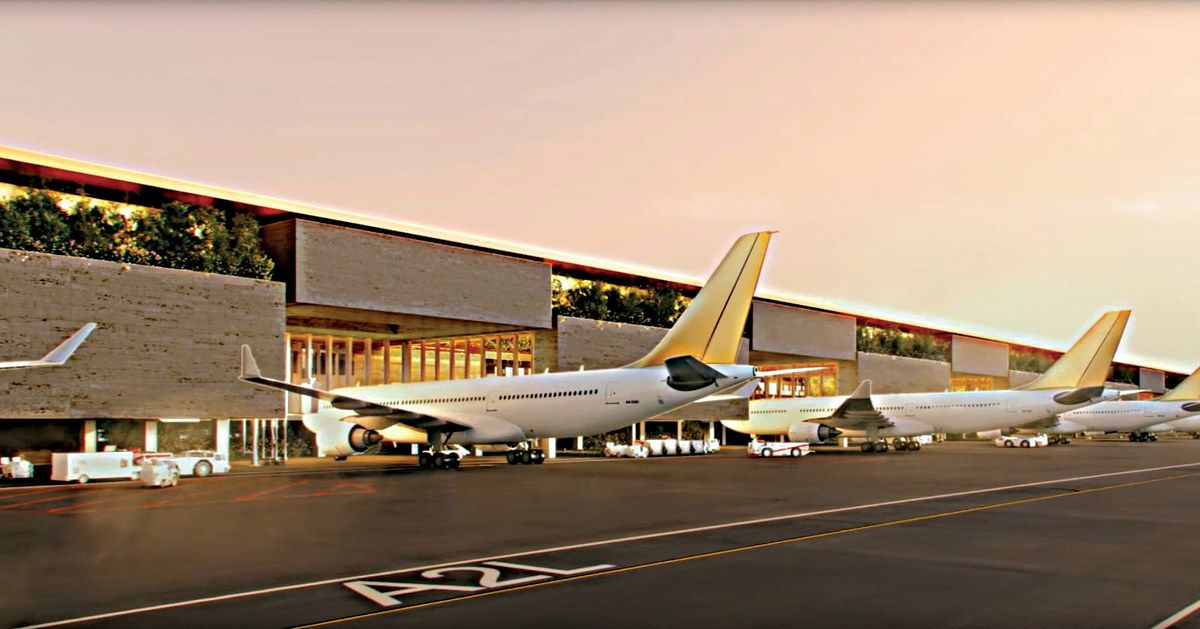
How Riyadh Air will help to transform Saudi capital into a major commercial travel and logistics hub
Situated between the three continents of Asia, Africa, and Europe, the Kingdom’s geographical location makes Riyadh an ideal gateway for trade and commercial air travel.
Crown Prince Mohammed bin Salman announced the second national carrier, Riyadh Air, on Sunday, offering tourists from all over the world a chance to visit Saudi Arabia’s resorts and attractions and to explore the wider region.
RIA is expected to add $20 billion to the Kingdom’s non-oil gross domestic product, create more than 200,000 jobs, and shape the nation’s local and global aviation ecosystem. It is also likely to bring the Kingdom a step closer to its goal of attracting 100 million tourists by 2030.
Wholly owned by the Kingdom’s Public Investment Fund, one of the world’s largest sovereign wealth funds, with total estimated assets of more than $620 billion, the new airline comes at a time when Saudi Arabia is fast emerging as a major tourism destination.
 The PIF’s latest investments in the aviation sector aim to raise the
industry’s financial sustainability and enhance its global
competitiveness to achieve the goals of Saudi Vision 2030.
The PIF’s latest investments in the aviation sector aim to raise the
industry’s financial sustainability and enhance its global
competitiveness to achieve the goals of Saudi Vision 2030.
“Riyadh Air will be a world-class airline, adopting the global best sustainability and safety standards across its advanced fleet of aircraft equipped with the latest cutting-edge technology,” PIF said in a statement.
It will enable many more tourists to visit the Kingdom, while also catalyzing the Saudi National Transport and Logistics Strategy and the National Tourism Strategy by increasing air transport options, raising cargo capacity and, in turn, growing international passenger traffic, it added.
The establishment of RIA falls in line with the sovereign wealth fund’s strategy of unlocking the potential of promising local sectors to help diversify the national revenue sources beyond hydrocarbons.
Under Vision 2030, the country’s economic and social reform agenda, Saudi Arabia aims to more than triple annual traffic to 330 million passengers by the end of the decade. It also wants to move up to 5 million tons of cargo each year.
The crown prince in November announced the masterplan for Riyadh’s new King Salman International Airport, which will span 57 sq. km, have the capacity to handle 3.5 million tons of cargo, accommodate up to 120 million travelers by 2030, and 185 million travelers by 2050. The capacity of Riyadh’s existing airport is around 35 million travelers.
 As Saudi Arabia sets its eyes on attracting 100 million tourists by
2030, Riyadh Air will likely bring the Kingdom a step closer to
achieving this goal.
As Saudi Arabia sets its eyes on attracting 100 million tourists by
2030, Riyadh Air will likely bring the Kingdom a step closer to
achieving this goal.
At the launch of the National Transport and Logistics Strategy in June 2021, the crown prince said the Kingdom aims to move into fifth place globally in terms of the number of transit passengers, increase the number of international destinations served by the country to more than 250, and to establish a new national air carrier.
RIA and King Salman International Airport are among the PIF’s latest investments in the aviation sector, aimed at raising the industry’s financial sustainability and enhancing its global competitiveness to achieve the goals of Vision 2030.
According to Dr. Abdullah Al-Maghlouth, a member of the Saudi Economic Association, the launch of a new carrier has been under discussion for some time.
“The talk about a new aviation company began in 2021 as part of Crown Prince Mohammed bin Salman’s 2030 plan to reduce the country’s dependence on oil as a source of income,” Al-Maghlouth told Arab News.
“These active moves will contribute to empowering these sectors, building partnerships with the local private sector, and ultimately add to diversifying the country’s economy and its sources of income.”
Saudi Arabia’s investments in the aviation industry comes as the sector emerges from the massive disruption of the COVID-19 pandemic, when lockdowns and travel bans halted commercial air travel, costing airlines billions in lost revenues.
According to the International Air Transport Association, the global airline industry will return to profitability this year, with airlines expected to post a small net profit of $4.7 billion — a 0.6 percent net profit margin. It is the first profit since 2019 when industry net profits were $26.4 billion.
The global passenger business is expected to generate revenues of $522 billion this year, with demand reaching 85.5 percent of 2019 levels over the course of 2023 — surpassing the 4 billion mark for the first time since 2019, with 4.2 billion travelers expected to fly.
Cargo markets, meanwhile, are expected to come under increased pressure this year with revenues of $149.4 billion — $52 billion less than 2022, but still $48.6 billion stronger than 2019.
Middle East carriers are expected to post a profit of $268 million in 2023, with passenger demand growth of 23.4 percent expected to outpace capacity growth of 21.2 percent, signaling a thirst for more investment.
“The region has benefited from a certain degree of re-routing resulting from the war in Ukraine, and more significantly so from the pent-up travel demand using the region’s extensive global networks as international travel markets reopened,” the International Air Transport Association said in a recent annual assessment.
Saleh Al-Jasser, Saudi Arabia’s minister of transport and logistic services, said the launch of RIA represents a new dawn for the future of air transport.
He said in a statement: “Saudi Arabia is witnessing a number of giant aviation projects that are the biggest of their kind in the history of aviation in the Kingdom.”
Such projects will reinforce Saudi Arabia’s position as a global aviation and logistics hub, in line with the country’s National Transport and Logistics Strategy, which the crown prince launched to transform the Kingdom into a hub connecting Asia, Africa, and Europe.
 Under the country’s economic and social reform agenda, Saudi Arabia aims
to more than triple annual traffic to 330 million passengers by the end
of the decade.
Under the country’s economic and social reform agenda, Saudi Arabia aims
to more than triple annual traffic to 330 million passengers by the end
of the decade.
The Kingdom’s busiest international airport is currently in the Red Sea coastal city of Jeddah, welcoming millions of Muslims performing the Hajj and Umrah pilgrimages each year.
Speaking to Al-Arabiya, the transport minister said RIA would complement the work of the Kingdom’s other national carrier, Saudia, which operates from Jeddah.
Al-Jasser said: “Riyadh Air will connect Riyadh with the rest of the world, while Saudia, which is operating from King Abdulaziz International Airport, will be focusing more on connecting Jeddah with the world. This way, the execution procedures of the National Transport and Logistics Strategy will match up with that of the civil aviation in the Kingdom.”
Commenting on how the launch of RIA would align with his ministry’s plans to expand Saudi airports, Al-Jasser said the King Salman International Airport would be one of the world’s biggest.
“Terminals 3 and 4 at the King Khalid International Airport in Riyadh were opened, and these expansion plans will continue until the King Salman International Airport is fully operational,” he said.
Appearing on Asharq Now, the newly appointed CEO of Riyadh Air, Tony Douglas, a veteran in the aviation industry with four decades of experience in transportation and logistics, called the launch “a momentous day in the history of commercial aviation.”
 Tony Douglas, CEO of Riyadh Air.
Tony Douglas, CEO of Riyadh Air.
“The crown prince has pronounced the establishment of a new national carrier. It is incredible because our brand, Riyadh Air, obviously connects with the capital city of the Kingdom of Saudi Arabia,” said Douglas, adding that the airline would be “serving the nation within two years.”
He added: “We will probably see very shortly the announcement of our first aircraft order, and I think that will signal the scale and the intent that sits behind the new national carrier. We look to take delivery of our first wide-body aircraft, long-range aircraft in early 2025.”











